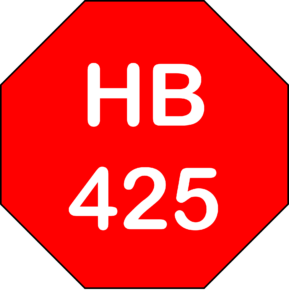
About HB 425
Currently in Georgia, there is a pathway for an individual on the State’s Sex Offender Registry (O.C.G.A. § 42-1-19) to petition a court for removal from either the registry or relief from 1,000 foot living and working restrictions provided that:
- Ten years have elapsed since the individual completed all prison and supervised release OR
- The individual has been classified by the board as a Level 1 (low) risk assessment AND
- The individual meets the criteria set forth in subparagraphs (c)(1)(A) through (c)(1)(F) of Code Section 17-10-6.2.
- The defendant has no prior conviction of an offense prohibited by Chapter 6 of Title 16 or Part 2 of Article 3 of Chapter 12 of Title 16, nor a prior conviction for any offense under federal law or the laws of another state or territory of the United States which consists of the same or similar elements of offenses prohibited by Chapter 6 of Title 16 or Part 2 of Article 3 of Chapter 12 of Title 16;
- The defendant did not use a deadly weapon or any object, device, or instrument which when used offensively against a person would be likely to or actually did result in serious bodily injury during the commission of the offense;
- The court has not found evidence of a relevant similar transaction;
- The victim did not suffer any intentional physical harm during the commission of the offense;
- The offense did not involve the transportation of the victim; and
- The victim was not physically restrained during the commission of the offense.
Why is this bill bad for Georgia?
This bill further punishes individuals who are classified by professional clinical investigators, and voted on by the State's Sexual Offender Registration Review Board (SORRB), as the lowest risk (Level 1) of recidivism. This will change the OR to an AND, requiring a 10-year waiting period for registrants to petition a court for relief for no other reason than uneducated fear. No other classification of crimes are subject to an in-depth analysis of their individual risk to reoffend.
An October 2019 presentation from SORRB to the State Senate, showed that the recidivism rates for Level 1 offenders over 10 years are between 0.9 to 9.7%. National research also indicates that approximately 5% of adult sex offenders commit new sexual offenses over time as compared to the national recidivism of 43%.
Claim:
Level 1 Registrants have committed some horrible crimes and need to remain on “the list.”
Fact:
The registry is a RISK based tool that the State of Georgia uses to determine the likelihood of someone committing a sexual offense against a child. There are 25 offenses that qualify an individual to be placed on the state’s Sex Offender Registry. The Sexual Offender Registration Review Board (SORRB) assigns each person on the registry to an investigator that is tasked with evaluating a variety of aspects about the individual AND NOT JUST the crime that they were convicted of. The investigators also look at the details of the individual case. In making a classification determination, the investigator looks at past criminal history, psychosexual evaluations, and other mental health screening tools. The investigator then makes a recommendation to the SORRB board as to how likely they feel this individual is to commit a future sexual offense. These recommendations are then reviewed by the entire Board and voted on.
Pursuant to O.C.G.A. § 42-1-13, Board membership includes three (3) professionals licensed under Title 43 and knowledgeable in the field of the behavior and treatment of sexual offenders, at least one (1) representative from a victims’ rights advocacy group or agency and at least two (2) representatives from law enforcement, each of whom is either employed by a law enforcement agency as a certified police officer under Tittle 35 or retired from such employment. O.C.G.A § 2-1-13(a) outlines appointment of Board members by the Governor of the State of Georgia and their terms.
Claim:
Some Judges believe that if an individual qualifies to be removed, they should be removed.
Fact:
Once someone is eligible for removal from the registry (by completing their sentence and having been classified as a Level 1 Risk determination) they must petition the Court for removal. A Court hearing is required, unless the District Attorney consents without requiring one. During the Court hearing, the registered citizen must carry the burden of proof that they deserve to be removed from the registry (ref. Royster v. Georgia, 346 Ga. App. 333, 335 (2018)). The District Attorney can call witnesses and present evidence as to why the registered citizen should not be removed. Only if the registered citizen is able to convince the Judge that they should no longer be on the register are they removed.
A Level 1 determination does not automatically qualify an individual from removal from the registry. The individual must petition the court and show "by a preponderance of the evidence that the Petitioner does not pose a substantial risk of perpetrating any future dangerous sexual offense."
April 2023 Update:
This bill did not make crossover for this legislative session. However, this bill could be introduced in the January 2024 session.

About HB 188
Until 2019, someone classified as a Sexually Dangerous Predator by the Sexual Offender Registration Review Board (SORRB) was required to wear an ankle monitor for life.
In 2003, Joseph Park was convicted of Child Molestation and nine counts of Sexual Exploitation of a Minor. He was sentenced to 12 years in prison with 8 years to serve. Upon his release from custody in 2011, SORRB classified Park as a Sexually Dangerous Predator which required him to wear an ankle monitor for life. Park sought a judicial review of this classification, but the decision was upheld.
In 2016, after Park had completed his sentence, he was arrested and indicted for tampering with his ankle monitor. He argued that he could not be prosecuted for this because the statute violated his 4th Amendment rights.
In 2019, the Georgia Supreme Court agreed with Park and ruled that requiring electronic monitoring of someone after the completion of their sentence was unconstitutional.
Why is this bill bad for Georgia?
Representative Sainz stated, in committee, that his bill would “protect Georgians from 53 people that completed probation and went on to commit another sexual offense.” Out of nearly 24,000 people on the registry, 53 people reoffended with a second sexual offense. That is a recidivism rate of 0.2%.
Electronic monitoring costs approximately $1,800 per person per year. The Department of Community Supervision (DCS) requires offenders to pay this cost. If this fee is not paid, a probationer could face revocation which could result in life imprisonment.
This bill would impose a TWO-STRIKE penalty for all risk classifications, not just the highest tier.Judges would be REQUIRED to impose LIFETIME ankle monitoring on EVERYONE convicted of a 2nd offense, not just Tier 3.
Supervised registrants who are classified as Sexually Dangerous Predators already must wear ankle monitors for the duration of their probation which can be 10 or more years. When the Sexual Offender Registration Review Board (SORRB) assigns a Sexually Dangerous Predator classification, clinical evaluators consider multiple factors, not just criminal history.
One size fits all solutions like HB 188 have the potential to impact individuals that may have exercised poor judgment and not criminal intent. This bill would take away a Judge’s discretion in those instances.
An October 2019 presentation from SORRB to the State Senate, showed that the recidivism rates for Level 1 offenders over 10 years are between 0.9 to 9.7%. National research also indicates that approximately 5% of adult sex offenders commit new sexual offenses over time as compared to the national recidivism of 43%.
Research & Analysis
This bill is designed to protect Georgia from Sexually Dangerous Predators. Of the 24,354 people on Georgia’s registry, 1038 (4.2%) are classified as a Sexually Dangerous Predator and would have previously been placed on electronic monitoring for life. Of those 1049, 34% are currently incarcerated (350). This bill exists because its sponsor incorrectly believes that registrants classified as Sexually Dangerous Predators are actively committing new offenses and are not being caught because they do not have electronic monitoring in place. Research indicates that approximately 5% of adult sex offenders commit new sexual offenses over time* as compared to the national recidivism of 43%.
*Source: https://tinyurl.com/soreoffend
Click here for our Summary Objections to HB 188.
Click here for our Talk Tuesday Justice presentation slides.
Click here to contact your Senator (upper chamber)
HB 194 (2021-2022) Senate Judiciary Committee Hearing
https://www.youtube.com/watch?v=szIUCPEmuGg
HB 194 (2021-2022) Vote by the House of Representatives
https://www.youtube.com/watch?v=yYUbVZ06UYU
HB 194 (2021-2022) Committee Hearing
https://www.youtube.com/watch?v=zIbhOLZDMa8
HB 194 (2021-2022) Subcommittee Hearing
April 2023 Update:
HB 188 was passed by the House and Senate. This bill is currently being sent to the Governor for signing.

